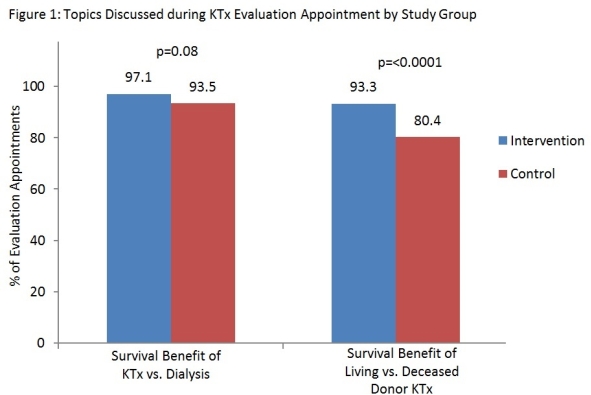Provider Attitudes Toward Shared Mobile Decision Aid Utilized Among Patients Evaluated for Kidney Transplantation: iChoose Kidney Randomized Trial.
1Emory University, Atlanta, GA
2Columbia University, New York, NY
3Northwestern University, Evanston, IL.
Meeting: 2016 American Transplant Congress
Abstract number: 172
Keywords: Mortality, Patient education, Risk factors, Survival
Session Information
Session Name: Concurrent Session: Novel Predictors of Outcome, Big Data and Technology
Session Type: Concurrent Session
Date: Monday, June 13, 2016
Session Time: 2:30pm-4:00pm
 Presentation Time: 2:42pm-2:54pm
Presentation Time: 2:42pm-2:54pm
Location: Room 302
Introduction: Although kidney transplantation (KTx) provides significant survival advantage over long-term dialysis, many end stage renal disease (ESRD) patients are not educated about KTx options. We developed a mobile clinical decision aid (iChoose Kidney) that provides individualized risk estimates of patient survival on dialysis vs. KTx to improve patient knowledge of treatment outcomes. We surveyed providers on whether the tool increased discussion about and helped patients better understand treatment options during the KTx evaluation.
Methods: We enrolled 470 patients from 3 large U.S. KTx centers. Patients were randomized to the usual KTx evaluation with a transplant nephrologist or surgeon (control; n=230) or an evaluation where the provider also used iChoose Kidney (intervention; n=240). After each patient-provider evaluation, we surveyed the 34 participating providers to assess the impact of iChoose Kidney on the discussion of treatment options with patients.
Results: Providers discussed the benefit of KTx vs. dialysis with 97% of intervention patients compared to 94% of controls (p=0.08). The benefit of living vs. deceased donor KTx was discussed with 93% of intervention vs. 80% of control patients (p<0.0001). In addition, providers believed iChoose Kidney improved understanding of the survival benefit of KTx vs. dialysis in 89% of intervention patients, and understanding of the survival benefit of living vs. deceased donor KTx in 86% of intervention patients. Providers also believed 66% of control patients would have benefited from using iChoose Kidney.
In addition, providers believed iChoose Kidney improved understanding of the survival benefit of KTx vs. dialysis in 89% of intervention patients, and understanding of the survival benefit of living vs. deceased donor KTx in 86% of intervention patients. Providers also believed 66% of control patients would have benefited from using iChoose Kidney.
Conclusions: Results show that the use of iChoose Kidney may help providers improve patient understanding of the survival benefit of KTx vs. dialysis, and the survival benefit of living vs. deceased donor KTx at the time of evaluation. Further analyses with longer follow-up time are planned to assess the impact of iChoose Kidney on KTx waitlisting rates.
CITATION INFORMATION: Basu M, Pastan S, Mohan S, Wolf M, Friedewald J, Ladner D, Smith K, McPherson L, Russell A, Chiles M, Patzer R. Provider Attitudes Toward Shared Mobile Decision Aid Utilized Among Patients Evaluated for Kidney Transplantation: iChoose Kidney Randomized Trial. Am J Transplant. 2016;16 (suppl 3).
To cite this abstract in AMA style:
Basu M, Pastan S, Mohan S, Wolf M, Friedewald J, Ladner D, Smith K, McPherson L, Russell A, Chiles M, Patzer R. Provider Attitudes Toward Shared Mobile Decision Aid Utilized Among Patients Evaluated for Kidney Transplantation: iChoose Kidney Randomized Trial. [abstract]. Am J Transplant. 2016; 16 (suppl 3). https://atcmeetingabstracts.com/abstract/provider-attitudes-toward-shared-mobile-decision-aid-utilized-among-patients-evaluated-for-kidney-transplantation-ichoose-kidney-randomized-trial/. Accessed February 3, 2026.« Back to 2016 American Transplant Congress
